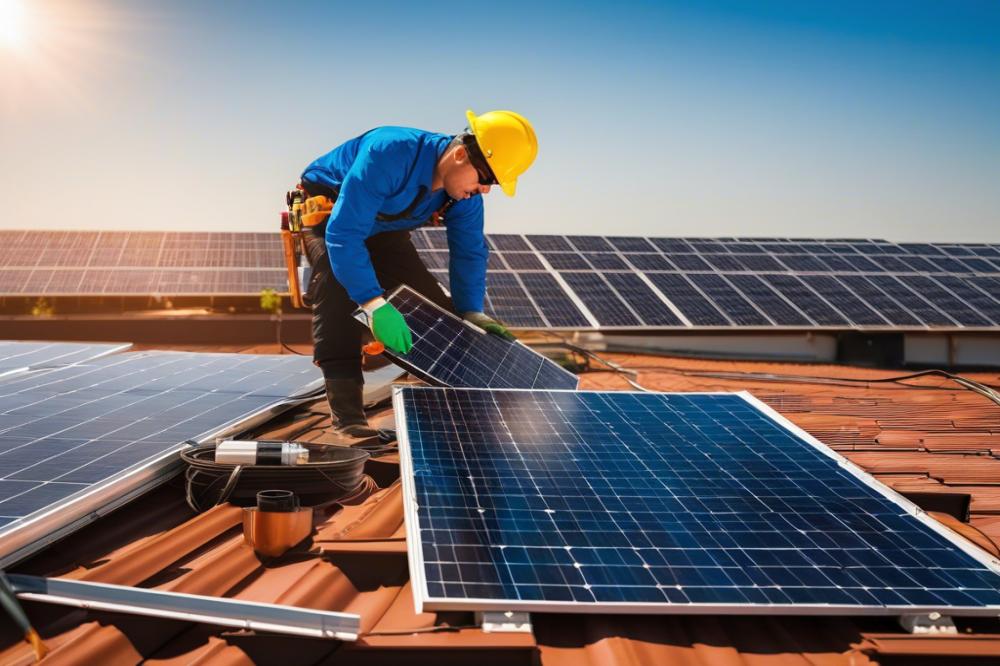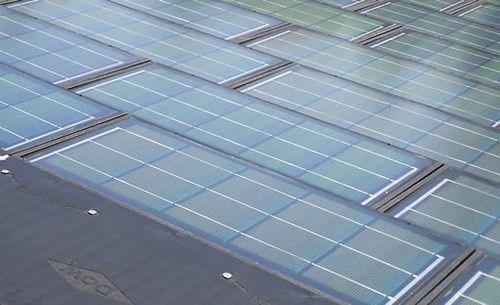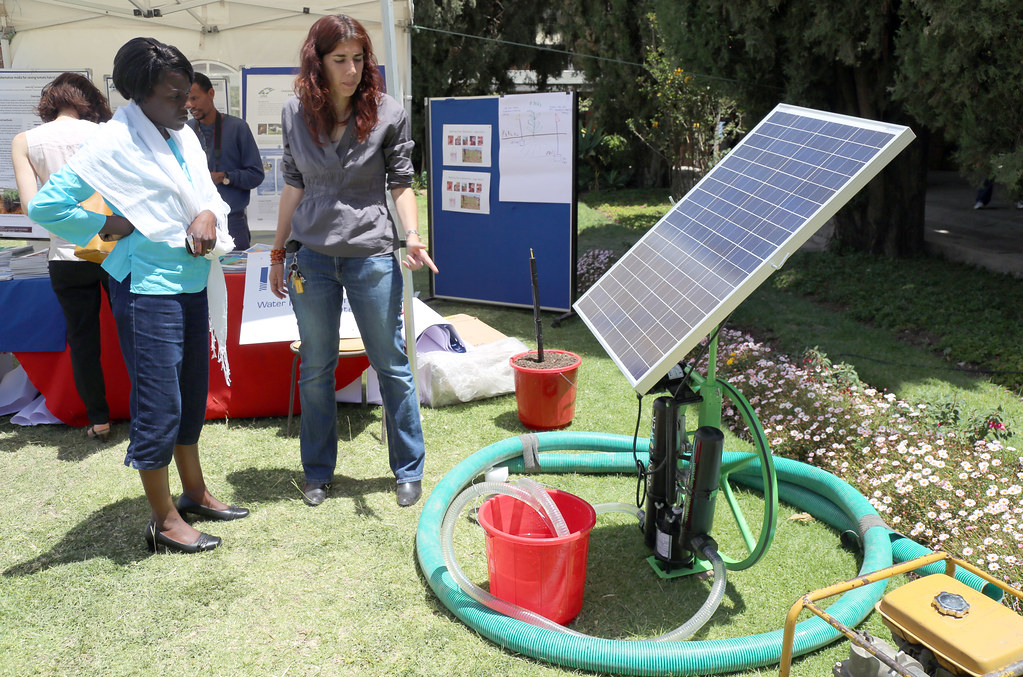Introduction
rooftop solar maintenance is essential for keeping solar systems operating at their best. Proper care directly impacts the solar panel efficiency and lifespan. Without regular upkeep, homeowners might face significant issues down the line.
Several challenges threaten the performance of solar panels. Rust can form due to moisture exposure, compromising structural elements and connections. It’s crucial to adopt rust protection strategies to mitigate these risks. Sand damage can also hinder efficiency. In sandy regions, the accumulation of particles can wear down solar surfaces. Awareness of sand damage prevention techniques can help protect investments.
Electrical outages are another concern for solar energy users. These interruptions can be frustrating and costly. Conducting a regular solar system inspection is vital. This proactive step aids in identifying potential problems early. Additionally, inverter maintenance plays a key role in ensuring seamless power flow. Addressing these challenges can lead to improved solar performance, effectively harnessing the sun’s energy.
In summary, understanding the importance of rooftop solar maintenance is crucial for any homeowner relying on solar power. Challenges like rust, sand damage, and electrical outages must be addressed to keep solar systems running smoothly. With the right tips and awareness, efficient solar energy use is achievable and sustainable.
Understanding Rooftop Solar Maintenance
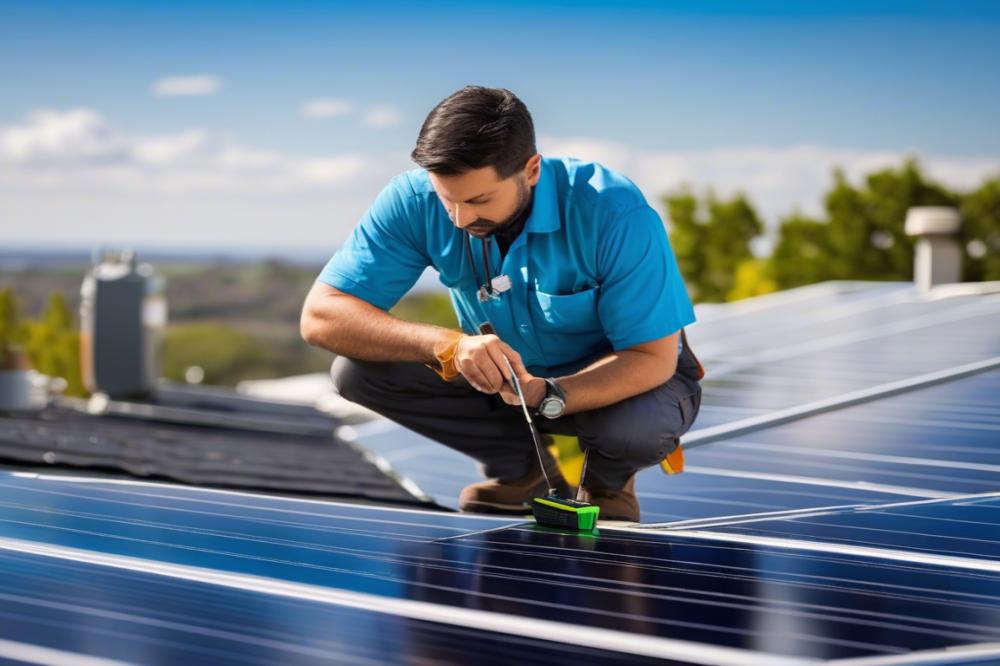
Rooftop solar maintenance involves caring for solar energy systems placed on rooftops. These systems harness sunlight to generate electricity. Over time, dirt, debris, and weather can affect their performance. Regular upkeep is vital to ensure they work at peak efficiency.
solar panel care plays a crucial role in maintaining energy production. Dust or sand accumulation can block sunlight and reduce effectiveness. Timely removal of these particles helps in preserving solar efficiency. Additionally, rust protection is essential for the metal parts of the system. Corrosion can lead to costly repairs and impact overall performance.
Common maintenance activities include routine cleaning and inspecting connections. Keeping the panels clean maximizes exposure to sunlight. Conducting periodic rooftop inspections can reveal potential issues like cracked panels or loose wiring. Inverter maintenance is another key task to consider. Inverters convert solar energy into usable electricity, and they need care too.
Annual solar system inspection is significant for long-term functionality. Scheduling this check helps identify problems before they escalate. During these inspections, technicians can check for sand damage prevention and other risks. Regular evaluations not only enhance performance but also prolong the system’s lifespan. Failing to keep up with maintenance could result in unexpected electrical outages.
Preventing Rust on Solar Panels
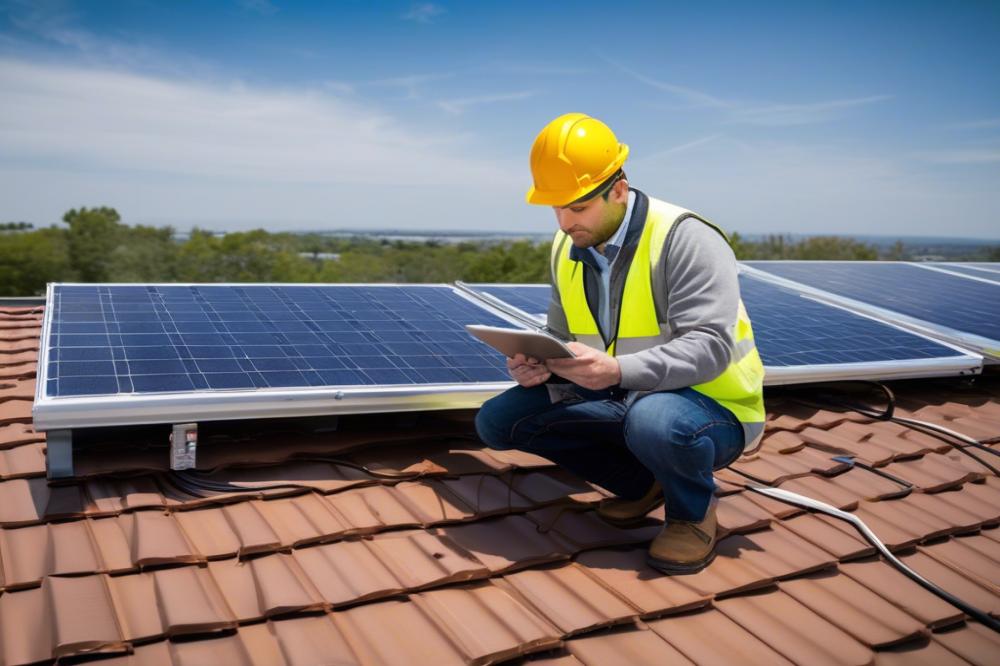
Rust on solar installations can be a significant issue that compromises efficiency. Understanding its causes is the first step to effective solar panel care. Commonly, rust occurs due to moisture intrusion, especially in areas with high humidity or heavy rainfall. In addition, exposure to saltwater is a major factor for coastal installations. Metal components that are not protected can corrode, leading to potential damage.
Addressing rust requires strategic actions. One effective rust protection strategy is applying a high-quality protective coating to metallic parts. These coatings create a barrier that helps prevent moisture from reaching the metal. Using corrosion-resistant materials during the installation can also make a notable difference. Stainless steel and aluminum are often preferred choices for mounting brackets and other hardware.
Routine solar system inspection is essential for early detection. Regular checks allow homeowners to spot signs of rust before it worsens. During these inspections, look for any discoloration or flaking paint on surfaces. Pay attention to bolts and screws, as these areas are especially vulnerable to rust. Taking note of these details can vastly improve solar efficiency in the long run.
For consistent rust prevention, incorporate maintenance tips into your routine. This includes cleaning around the solar panels to keep debris and moisture away from the system. Additionally, conduct rooftop inspections to assess any potential risks. Proper drainage on the roof helps reduce standing water, which can foster rust formations. Remember that protecting your solar panel setup not only prolongs its lifespan but also aids in electrical outage prevention.
Sand Damage Prevention
Sand can be a significant threat to solar panels, especially in areas with strong winds and frequent storms. It causes abrasion, which can scratch the surface. Those scratches reduce sunlight absorption. Over time, this can lead to decreased solar efficiency. Protecting solar panels from sand damage is essential for long-term performance.
Understanding effective techniques for sand damage prevention is crucial. One method involves the installation of protective barriers. These barriers can deflect wind-borne sand away from the panels. When considering installation, choose materials that are durable and weather resistant. High-quality barriers can reduce direct exposure to harmful particles.
Regular cleaning and maintenance schedules play a vital role as well. Dust and sand can accumulate and hinder performance. Set up a routine to inspect the panels at specific intervals. This will help detect any build-up before it becomes problematic. Maintenance tips should include gentle washing methods. Avoid harsh chemicals, as they may harm the panel surface.
Rooftop inspections are necessary, especially in sandy environments. Look for signs of wear, scratches, or debris accumulation. Implementing these checks can prevent minor issues from escalating into major concerns. In areas prone to sand exposure, consider angled installations for your panels. This can help minimize the accumulation of sand and debris. Further precautions may include using high-quality inverters to prevent electrical outages due to extreme conditions.
Electrical Outage Prevention
Solar systems, while efficient, can face various electrical outages. Common causes often include inverter failure, weather-related issues, or faulty wiring. Inverter maintenance plays a critical role in avoiding these disruptions. When inverters malfunction, the whole system risks failure.
Regular solar panel care is essential. Routine inspections can identify early signs of wear or damage. Keeping an eye on electrical connections also contributes to system reliability. Loose or corroded connections may lead to power loss or surges.
Inverter Maintenance and Its Role in Preventing Outages
The inverter converts the direct current produced by solar panels into usable alternating current. If it falters, homeowners may experience outages. Regular cleaning and system checks can help spot issues before they escalate. Replacing or servicing components as needed is vital to maintaining solar efficiency.
Importance of Monitoring Electrical Connections
Building a habit of checking connections can greatly improve system performance. Over time, dirt, moisture, or rust can compromise these links. Paying special attention after storms or high winds helps in detecting damage. This proactive approach aids in sand damage prevention and weather resistance.
Routine Checks to Identify and Rectify Potential Issues
Developing a schedule for rooftop inspections ensures all system parts are in good shape. During these checks, examine the inverter, wiring, and panels for any visible issues. Promptly addressing rust protection and electrical problems can prevent bigger outages down the road. Taking routine precautions not only safeguards the investment but also enhances overall performance.
Rooftop Inspections for Optimal Performance
Benefits of Regular Rooftop Inspections
Regular rooftop inspections provide important insights into the condition of your solar panels. Gaining knowledge about potential issues is key for long-term performance. This proactive approach is highly beneficial in maximizing solar efficiency. By catching problems early, homeowners can avoid costly repairs and maintain system integrity. Overall, a well-maintained solar array can lead to greater energy savings.
Identifying Issues Before They Escalate
Observation is important when it comes to identifying potential problems. Small signs of wear, like rust or loose panels, can be indicators of larger issues. Sand damage prevention starts with early detection of sand buildup on surfaces. Additionally, assessing electrical components can help in spotting faults before they lead to a complete electrical outage. Regular checks can simplify subsequent maintenance.
Best Practices for Conducting Rooftop Inspections
Conducting thorough inspections requires careful planning. Begin by walking through the area surrounding your solar setup. Look for visible debris, dirt, or any signs of corrosion. Safety is critical, so always prioritize using a sturdy ladder or harness. Consider checking the inverter regularly, as it is a crucial component in the system. Documenting each inspection can also prove valuable for future reference.
Utilizing Professional Services vs. DIY Approaches
Hiring professionals can offer peace of mind in solar system inspection. Trained technicians bring expertise in rust protection and weather resistance. They often spot issues that may go unnoticed by untrained eyes. On the other hand, a DIY approach can save money, but it requires careful attention to detail. Knowledge about solar panel care is essential for anyone choosing this route. Weighing the options comes down to comfort level and experience in property maintenance.
Weather Resistance and Maintenance Tips
Weather can greatly affect solar panel care. Rain, wind, and sandstorms all pose risks to rooftop systems. For instance, heavy rains may clear away dirt, but they can also expose panels to potential rust. Wind carries debris that can scratch surfaces, leading to long-term damage. Understanding these factors is vital for your solar system’s longevity and performance.
Strategies for Enhancing Weather Resistance
Applying protective coatings to your solar panels can help against rust. These coatings provide a barrier against moisture. Sand damage prevention involves regular cleaning, especially in sandy areas. Keeping panels clean maintains their efficiency. Installing panels at an angle can also limit how much sand settles on the surface.
Best Maintenance Tips Through Seasonal Changes
Every season brings unique challenges. In summer, check your solar system for overheating and ensure that ventilation is adequate. Winter requires inspection of snow accumulation. Snow can block sunlight and hinder energy production. Regularly clearing off snow is essential for optimal output.
Adapting Maintenance Routines Based on Weather Conditions
Tailor your maintenance routines based on the current weather. After a storm, perform a thorough solar system inspection. Look for any signs of damage, such as scratches or loose connections. In hot weather, inverter maintenance should be prioritized. Heat can cause malfunctioning, so keeping components cool is necessary. Make it a habit to check your panels periodically, regardless of the weather.
Final Thoughts on Solar Panel Care
Rooftop solar systems require regular upkeep to function optimally. Understanding the necessity of maintenance is crucial for homeowners who wish to reap the full benefits of their investment. Proactive measures can significantly inhibit issues like rust and sand damage. When these concerns are addressed promptly, it leads to a more durable and efficient system.
Investing in routine checks not only combats potential rust and damage from sand but also minimizes electrical outages. The advantages of maintaining your solar panels go beyond just preventing immediate problems. Regular maintenance translates into long-term savings and peace of mind. Knowing that your system is functioning at peak performance offers a level of comfort that is hard to measure.
Ultimately, neglecting solar panel care can lead to significant complications down the line. Every homeowner should prioritize maintenance not just as a chore, but as a vital aspect of ensuring sustainable energy production. By doing so, you contribute to the longevity of your system and enhance its overall efficiency. Look after your rooftop solar installation, and it will reward you over the years with reliable energy and reduced costs.

